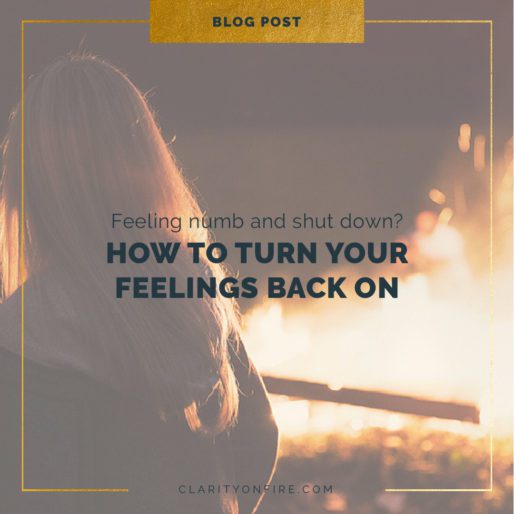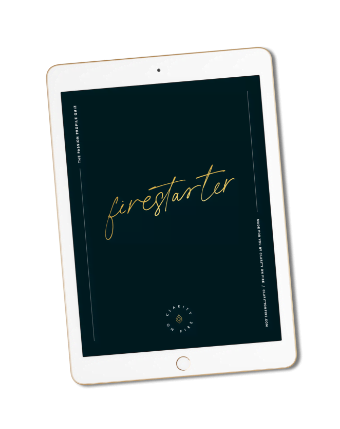If reading long blogs just isn’t your deal, you can listen to me read it instead!
(Click the play button to start playing right here on the page, or download and save it for later by clicking the downward arrow at the top right of the box below.)
It was a Sunday in March 2015. Kristen and I had flown down to Fort Lauderdale to speak at a women’s conference, which had wrapped up the night before.
The weather was glorious — clear blue sky, breezy, and 60-degrees. It was crisp, but not cold; the perfect conditions for sitting at an outdoor café, bundled up in a light scarf and jacket, and sipping hot tea.
And yet … there amidst the sunshine and happy, chattering people, I was having a complete emotional breakdown.
My sunglasses were on, but it was pretty impossible to hide the fact that I was silently sobbing, completely unable to stem the tide of tears and deep sadness that was pouring out of me, almost faster than I could control it.
In hindsight, it’s easy to see that there was an absolute perfect storm of events that converged that weekend to plow me over.
The conference had completely drained me, and not in a “fun” way. I’m an introvert, and we’d been going-going-going since we landed in Florida two days earlier. I’d had no time to be alone or recover. All weekend Kristen and I had felt like the only two introverts in a group of thousands of extroverts. What we’d thought would be a fun weekend had been incredibly exhausting and, even though we’d been surrounded by people, weirdly lonely.
The food situation had been dicey at best. I’ve always had a sensitive system, and I do best when I can cut certain foods out of my diet, which had been difficult to do all weekend. So on top of being exhausted, I was feeling physically “off.”
We were also trying to launch a course for the first time, from a remote location, which was completely stressful, and enrollment wasn’t going well. So I was feeling like a failure, questioning whether we’d ever be successful, and freaking out about our money situation.
And then the cherry on top — Kristen was dating a guy I really didn’t like and knew was no good for her, but I couldn’t share just how wrong I felt it was (because that had never gone well in the past, and I was trying to learn my lesson about not interfering in other people’s lives, even when you love them). I’d been in a confined space with her for two days while trying to hide my feelings, which as her best friend was completely eating away at me.
I’d been simmering for days, and that Sunday at the café it all boiled over — grief, fear, anxiety, heartache, rage, loneliness, exhaustion — I cried for hours without stopping.
Kristen kept staring at me with wide eyes, asking what was wrong. But I couldn’t open my mouth. I literally could not form words for the depth of emotion I was experiencing. All I had was an endless supply of tears.
HOW OFTEN DO WE ACTUALLY FEEL OUR FEELINGS?
It’s pretty safe to say that what I experienced that day wasn’t exactly “normal.” We usually have far more control over our emotions, and most of us are really good at shutting them down.
And it makes sense — why would anyone want to go through that? Why would you willingly volunteer to experience waves of wrenching grief, sadness, loneliness, despair, rage, or anxiety if you could avoid it?
Not only that, but we’re encouraged to shut down our feelings in almost every way you can imagine:
- How many times were you told as a kid to “suck it up” or reprimanded for crying for “no reason”? We’re taught that vulnerability is weakness — something to be ashamed of.
- Why is it that, for most of American history, women weren’t “qualified” to be President? Because they would be too emotional.
- What happens when you cry at work? You’re called
- What are we encouraged to do as college grads? Take the job that earns us the most money and prestige, not pursue a path that we love and feel deeply
- Why do we so rarely tell people how we actually feel? Because we’re afraid that we’ll be disliked, misunderstood, or rejected.
SO WE TURN TO THE THINGS THAT HELP US NOT FEEL
Throughout our life we learn that feelings are awkward, painful, sticky, and scary.
It’s much cleaner and easier to suppress, stifle, suffocate, and amputate them. And when we shut our emotions down, we often get praised — for being “logical” and “put together” and “strong.”
We get really good at not feeling. As soon as an uncomfortable feeling starts to bubble up, we numb out with …
- Booze: Be it a nightly glass of wine or a weekend of binge drinking.
- Pills: Anything that helps suppress the physical and emotional pain.
- Sex: We use other people’s bodies, as well as porn, as a place to hide.
- Scrolling: We reach for our phone and automatically pull up Facebook, Instagram, Twitter, Snapchat.
- TV: We mindlessly binge-watch shows to escape from our discomfort.
- Over-working: We work until 9pm so we don’t have time to feel.
- Over-planning: We keep ourselves endlessly busy so we’re too exhausted for introspection.
We’ve become so good at not having to feel anything that what should be normal and come naturally to all humans — allowing yourself to feel things — is now a rare thing to do, let alone be good at doing.
EXCEPT WE’RE MAKING OURSELVES SICK, SAD, AND ANGRY
My friend Joanna made a really great point on her podcast (Love Always, Jo) the other day:
There’s a reason that we cry in the face of intense emotion (happy, sad, and everything in between). Tears aren’t random, or arbitrary. They’re a biological mechanism that’s literally designed to help us release emotion.
So, if we’re supposed to be releasing emotion, but most of us don’t (at least, not often enough), because we feel ashamed or afraid or numb … then what happens when we don’t?
The answer is pretty clear: We get sick, sad, and angry.
Cutting off and stifling our feelings doesn’t make all that energy disappear; it just turns inward and starts to fester.
At best, that means we’re functional, but unable to really enjoy life. (Because if you can’t feel the uncomfortable stuff, you also can’t feel the good stuff: joy, love, connection, contentment.) It’s like we’re existing, but not really living.
More likely, we get depressed. We suffer from constant anxiety. We can’t take a deep breath. We’re resentful and unhappy and can’t figure out why.
At worst, all that internalized stress builds in our bodies until we have an actual disease (literally, dis-ease) or addiction.
And at the very worst, that pressure erupts into violence against yourself and other living beings.
THE HOT LONELINESS
If you want to be a human who’s capable of joy, deep contentment, and big love, then you’ve also got to be a human who’s capable of grief, fear, and rage.
If you refuse to feel half of your emotions, then you’re refusing to feel all of them.
So … how do we feel the hard stuff without shutting down and numbing out?
We learn to sit with what Pema Chodron, the American Tibetan Buddhist nun, calls “hot loneliness” — AKA that rush of uncomfortable (but totally normal and human) emotions like shame, grief, rage, fear, anxiety, despair, heartbreak, resentment, and sadness that bubbles up within us from time to time.
Pema says:
“If the hot loneliness is there, and for 1.6 seconds we sit with that restlessness when yesterday we couldn’t sit for even 1, that’s the journey of the warrior.”
We’re so afraid that if we allow ourselves to feel an uncomfortable emotion, we might get stuck there permanently. So we numb and suppress and shut down; often for years.
But here’s the irony of that:
Humans aren’t capable of sustaining any one emotion for very long. If you allow the wave of “hot loneliness” to come without reaching for your phone, or a drink, or another hour in your inbox, it will pass. It might take a minute, or an hour, or a day, or a week, but you will not get stuck in that feeling forever.
I love that Pema calls this the “journey of the warrior,” because it shows that strength is not about being invulnerable and shutting your feelings down.
Strength is letting a wave of pain wash over you and proving to yourself that you can survive it. It’s allowing discomfort to transform you into a resilient human who’s capable of deeply feeling everything — the love, the joy, and everything else that makes life worth living.
This is how you learn to feel again:
The next time you feel the “hot loneliness,” don’t move. Just sit. Let it out. Feel how you need to feel. Breathe through the discomfort (and it will be uncomfortable). And know that this — feeling all the things — is both the best and worst of what it means to be human.
I didn’t know it, but that day at the café? I was letting the hot loneliness out. And yeah, it sucked. But the next day, I was OK. My problems hadn’t been solved, but I felt better about them, because I wasn’t suppressing them anyone. Which made it easier to move forward.
What about you? How might you be numbing instead of allowing yourself to feel? When have you let the hot loneliness out? Come share with me, in the comments.
IF YOU LIKED THIS, THEN YOU’LL ALSO LOVE …
Things you can look forward to when you’re not numb anymore
Are you blocking yourself from joy?
How to get through any major life transition
Much Love,
Rachel (& Kristen)
P.S. I first learned about the concept of “hot loneliness” in Glennon Doyle’s memoir Love Warrior. I cannot recommend this book enough!
P.P.S. For those of you concerned, I eventually did tell Kristen how I felt about that dude. Things eventually ended with him, and our friendship obviously survived. And I got her permission before talking about this.




This article is perfect. It’s exactly what I needed to read today. Thank you for expressing the importance of feelings and encouraging everyone, including myself, that this numbness can be beaten. There is a light at the end of the tunnel. God bless.
You’re welcome, Rebecca! I’m glad that this blog found you at the right time. 🙂
Wow, at 64 yrs old I have gotten so good at suppressing my feelings. I use wine, food, laughter and showing, “gratitude and appreciation” outwardly to mask my hot loneliness. I feel like I don’t deserve to hate driving 90 minutes to and from work and hating my job. I mean, I’m so close to retiring at 70 I should just “suck it up”. I feel sick to my stomach every day, get cold sores and fight back depression and crying and have put on weight. But ther are times, in a hot morning shower when my husband is walking the dog that I can’t hold it in any longer and let it all out. It is so cleansing!!
Hey Anita,
Thank you so much for sharing this! I don’t think you deserve to hate your job and your terrible commute, either. And while you may be close to retirement, six years is still a long time. And what’s the compound effect of six more years spent doing something you don’t love, and physically/mentally/emotionally suffering for it? That can’t be good for your health or your quality of life!
I know it’s easy to think that at 64 it’s difficult to make a change. But every age has its pros and cons when it comes to their career; your age shouldn’t determine whether you’re happy or not in your job, and I think there are plenty of people who’ve made a shift in their sixties. I wonder what you might do differently if you believed it was possible to make a change *before* you retire? Something to think about. 🙂
Whew, good stuff! Thanks for your gift of words… helping to right turned ships in stormy seas. 🙂
Thanks, Nate! I think you have a gift with words too, considering your description of “turned ships in stormy seas.” 🙂
I keep suppressing my hot loneliness 🙁
Within the first year of me starting a new job, I had my boss sit down and explain to me that my highs were too high and my lows were too low. I learned pretty quickly that the goal is to make the lows less low. (That said, I was also definitely not getting enough sleep at the time, which was not helping. Normal Chrystina doesn’t drop nearly as low as completely sleep deprived Chrystina.) But I’ve been saying for a long time that you can’t have one without the other and I’m starting to become more okay with it.
Now at the age of almost 29 I’m better at reading myself. If I feel myself about to get mad or overwhelmed, I can try to excuse myself from the situation, get a grip, and come back in a little more clear-headed after taking a few deep breaths. The problem comes in when I can’t get away to clear my head in that exact moment.
It happened to me very recently at a training. I HATE simulations. With such a left-brained mind, I can’t figure out the difference between reality and simulation, I’m not sure if I’m responding as myself or as character. And I was doing one of those lovely simulations where you’re talking out an awkward conversation in front of a room full of people, and somebody cut me off and told me that I was doing it horribly wrong. And I listened to what she had to say, and I nodded, and I got very quiet. And right after, I excused myself to the bathroom and cried. When I came back people asked if I was okay and I felt a million times better, but still had to awkwardly explain what happened, but that I was fine now.
And it’s not like I can’t handle myself, or am too weak to deal with the situation, I just need to get the emotions out of the way so I can logic my way into a correct solution.
I’m going to keep rambling about this for a minute. I was at a women in construction conference recently and some of the head women explained that at the beginning of the meeting they would explain to the folks in the room that their highs are highs and their lows are low and that’s just the way it is, but never feel like you can’t come to them with something. I thought that was a cool way to deal with it. If you put it out on the table, then someone else doesn’t have the right to put their version of it out there first. (Granted, I think you need to work your way up the food chain a little bit and prove yourself before you’re allowed to do that, but it’s progress.)
I resonate with everything that was said there is just one issue, I had a VERRY bad and large array of issues, trauma, heartbreak, and on top of being dragged to a new town with no one I knew and my parents hating me I was freshly 18 with not a day of schooling in my life and I spent a whole month just sitting in my hot loneliness, it got so bad that something snapped, I almost hurt myself without realizing it, and here I am a year later and I can’t feel a single emotion. The most I get is a few tears every few months on my period but nothing real. How do I fix this?
I’m so sorry, Sarah! That sounds really rough. It sounds to me like therapy would be a very good, healthy outlet for you. If you haven’t explored your options in that realm, I would start there.💞
I’ve been going through life apparently perfectly composed and content, but anytime someone expresses a strong emotion or feeling towards something, I have to sit with the fact that I haven’t felt any emotion strongly for a long time. I’ll practice sitting with the boredom and anxiety and restlessness rather than going straight to my phone or laptop.
Thank you for the article.
So glad this helped you, M! If you’re looking for other content about getting in touch with your feelings, here are a few that might resonate with you:
https://clarityonfire.com/emotional-constipation/
https://clarityonfire.com/labeling-emotions/
https://clarityonfire.com/magic-8-ball-intuition-vs-fear/